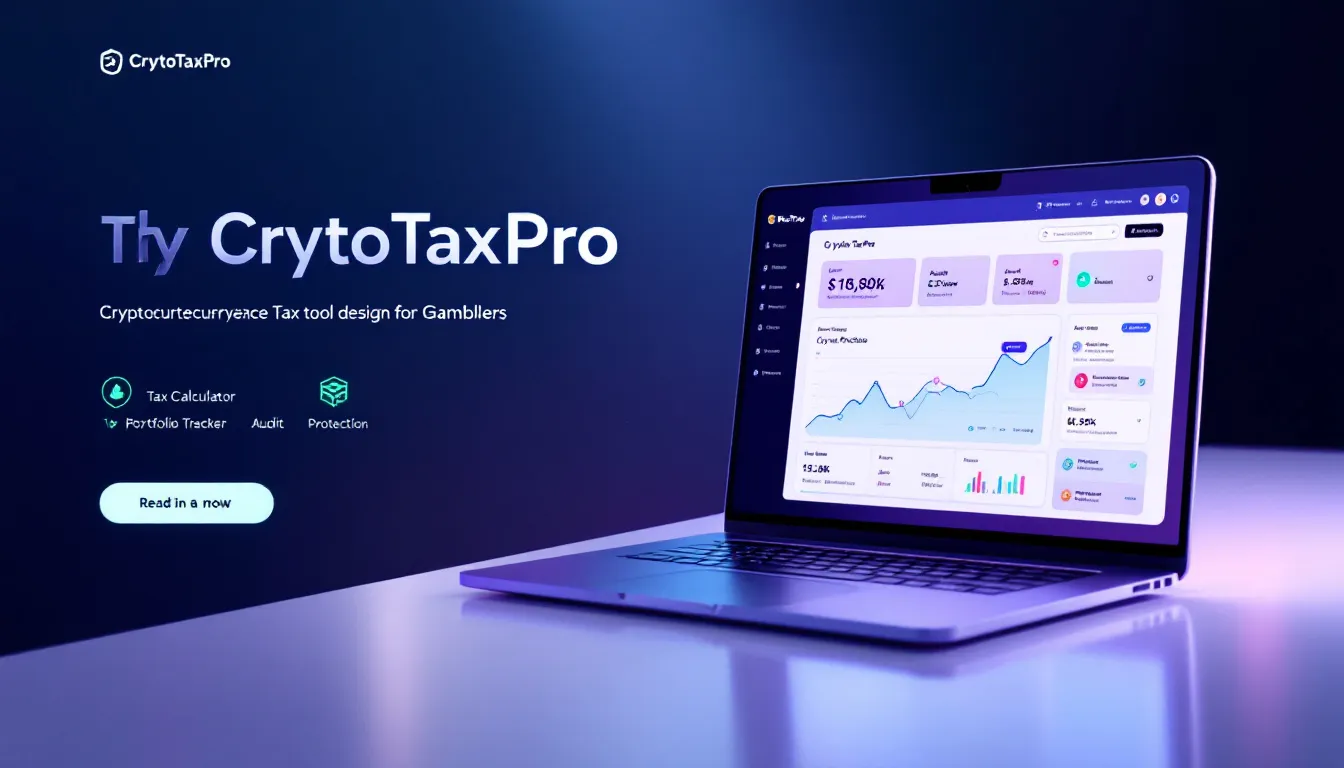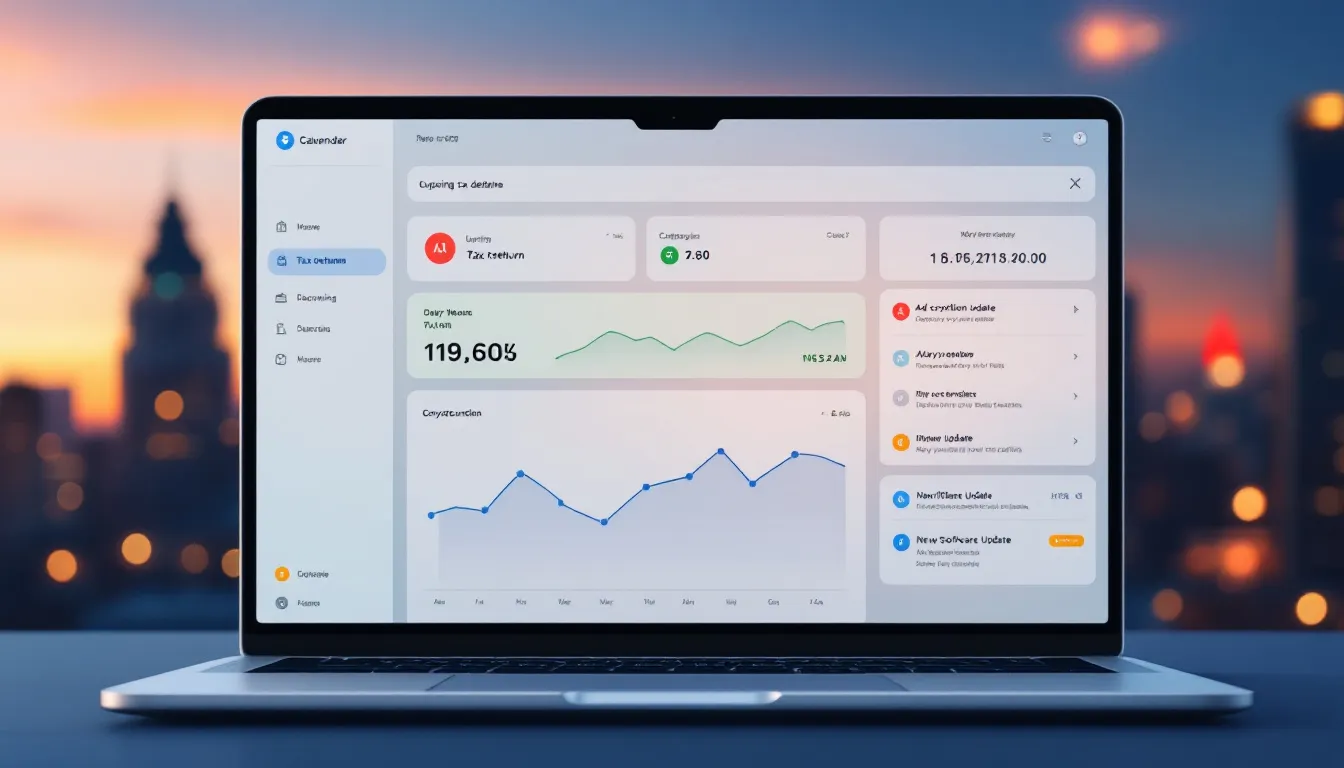Cryptocurrency gamblers need specialized tools for managing taxes. This article explores the best crypto tax tools for gamblers in 2025. Find out how to track winnings, calculate taxes, and stay compliant.
Key Takeaways
- Crypto gambling winnings are classified as taxable income by the IRS, requiring accurate reporting and record-keeping to avoid penalties.
- Effective crypto tax tools for gamblers should automate data synchronization, accurately determine cost basis, and generate IRS-compliant tax reports.
- Key crypto tax calculators for 2025 include CoinLedger, Koinly, and TokenTax, each offering unique features tailored to the complexities of crypto gambling tax obligations.
Top Crypto Tax Calculators for Gamblers in 2025
| Feature / Tool | CoinLedger | Koinly | TokenTax |
|---|---|---|---|
| Ease of Use | Very user-friendly, beginner-friendly UI | Clean, intuitive interface | Slightly more complex; suited for advanced users |
| Gambling Transaction Tracking | ✅ Supports tracking across exchanges & wallets | ✅ Offers features tailored for gambling transactions | ✅ Strong manual & automated tracking capabilities |
| Exchange & Wallet Integration | 500+ integrations; excellent auto-sync | 700+ exchanges & wallets supported | Good integrations; excels with manual CSV uploads |
| Tax Form Generation (IRS-compliant) | Form 8949, Schedule D, TurboTax/TaxAct integration | Form 8949, Schedule D, export to TurboTax | Extensive support incl. 8949, Schedule D, & more |
| Cost Basis Methods Supported | FIFO, LIFO, Specific ID | FIFO, LIFO, HIFO, Average Cost | FIFO, LIFO, HIFO, SpecID; full flexibility |
| Tax Optimization (e.g., HIFO support) | ❌ Limited optimization strategies | ✅ HIFO & other methods for optimization | ✅ Full tax-loss harvesting & optimization features |
| Error Detection & Reconciliation | ✅ Auto-detects missing data, offers corrections | ✅ Strong reconciliation tools | ✅ Advanced audit trail & error reporting |
| Professional Tax Help | Optional CPA review available | Email & chat support; some expert review | ✅ Includes access to crypto CPAs for full filing |
| Audit Support | Email-based support; limited direct audit defense | No direct audit support | ✅ Includes audit defense with higher-tier plans |
| Pricing (Approx.) | Free plan available; paid starts ~$49/year | Free preview; paid plans start ~$49/year | Paid only; starts ~$65/year, higher for CPA services |
| Best For | New or moderate gamblers wanting easy automation | Gamblers needing accurate tracking & cost-basis tools | High-volume gamblers or those with complex tax needs |
Navigating the maze of crypto taxation can be simplified with the right tools. In 2025, several crypto tax calculators stand out for their ability to handle the unique needs of gamblers. These tools not only help you track your crypto transactions but also ensure that you stay compliant with tax laws.
Among the top choices are CoinLedger, Koinly, and TokenTax. Each of these platforms offers distinct features tailored to gamblers, making them invaluable for tracking gambling-related transactions on a gambling site and generating accurate tax reports.
Here are the specifics of what makes each of these tools exceptional for crypto gamblers.
CoinLedger
CoinLedger is often hailed as the best crypto tax calculator, and for good reason. It offers a comprehensive suite of features, including transaction tracking, expert review services, and report generation to assist in tax calculations. This platform supports over 500,000 crypto investors, reflecting its reliability and widespread trust within the community.
One of CoinLedger’s standout features is its ability to connect directly to hundreds of exchanges and wallets, facilitating the seamless import of transaction data. Users find the platform user-friendly and easy to learn, which is crucial for those new to crypto taxation. Moreover, CoinLedger’s customer service is noted for being responsive, professional, and patient, providing much-needed support during the tax season.
CoinLedger generates comprehensive tax reports, streamlining the tax filing process and ensuring accurate accounting of all crypto gains and losses. Its ability to adjust the transaction import process to match varying formats of different exchanges further enhances its utility. CoinLedger is a top-tier choice for gamblers seeking to simplify their tax obligations.
Koinly
Koinly is another excellent crypto tax tool specifically designed for gamblers. It offers accurate reporting capabilities that help users ensure they are correctly documenting their gambling-related transactions. This precision is crucial for staying compliant with tax regulations and avoiding potential penalties.
The platform is user-friendly, making it accessible even for those unfamiliar with crypto taxation. Koinly includes tools specifically tailored for tracking and reporting on gambling transactions. Its integration capabilities with various exchanges and wallets simplify the process of importing and managing transaction data.
Koinly’s ability to generate IRS-compliant tax forms, such as Form 8949 and Schedule D, further streamlines the tax filing process. This ensures that you have all the necessary documentation to report your crypto gains and losses accurately. Koinly offers a seamless and efficient solution for managing crypto tax obligations.
TokenTax
TokenTax is a leading crypto tax tool offering advanced features that are particularly beneficial for gamblers. One of its standout features is the ability to select various accounting methods, including HIFO (Highest In, First Out), which can help reduce taxable gains for the year. This flexibility allows users to optimize their tax outcomes based on their specific situations.
The platform provides comprehensive reporting tools that streamline the tax filing process. These tools are designed to handle the complexities of crypto gambling transactions, ensuring that all taxable events are accurately reported. Additionally, TokenTax offers access to professional tax advice, which can be invaluable in navigating complex tax situations.
For gamblers, TokenTax’s advanced features and access to expert advice make it a formidable tool for managing crypto taxes. Its ability to generate detailed tax reports and optimize tax outcomes ensures that you stay compliant while minimizing your overall tax liability.
Understanding Crypto Gambling Taxes

The IRS treats cryptocurrencies as property, a fact that fundamentally shapes how crypto transactions are taxed. This means that any use of crypto, whether for investing, spending, or gambling, can trigger either capital gains tax or income tax, including cryptocurrency taxes. Gamblers need to grasp these implications to avoid unexpected tax liabilities.
Whenever you win from crypto gambling, those winnings are subject to both federal and state income tax. The IRS classifies all crypto gambling winnings as taxable income, meaning you must report them just like you would with any other form of gambling income. Accurate record-keeping and timely reporting are essential under this requirement.
Additionally, converting your crypto to fiat currency for gambling can incur capital gains tax. The capital gains tax applies when you dispose of your cryptocurrency, including converting it to USD for gambling. To calculate these taxes, you need to determine the difference between the crypto’s value at the time of acquisition and its value at the time of conversion or sale. Selling crypto and understanding these principles is the first step towards staying compliant and avoiding hefty penalties.
Essential Features of a Crypto Tax Tool for Gamblers

When it comes to managing crypto taxes, especially for gamblers, the right tools can make all the difference. A robust crypto tax tool should automatically synchronize with various wallets and accounts to minimize manual data entry. This feature is essential for those who engage in high volumes of transactions across multiple platforms.
Another critical feature is the ability to determine the cost basis accurately. This involves taking into account the original acquisition cost and any related fees. An ideal tax tool should also offer advanced reconciliation services to handle complex data situations, ensuring that all transactions are accounted for correctly. Automated error detection and troubleshooting capabilities are vital for maintaining accuracy and compliance in tax calculations.
Lastly, the tool should generate comprehensive crypto tax reports, streamlining the filing process. These reports should be IRS-compliant and capable of detailing all your crypto gains, losses, and income from gambling activities. Selecting a tool with these features can significantly ease tax reporting, allowing gamblers to focus on their game.
How to Use Crypto Tax Tools Effectively
To get the most out of your crypto tax tools, it’s essential to start by gathering all transaction data from your exchanges and wallets. This foundational step ensures that your tax reports are comprehensive and accurate.
Connecting your crypto accounts to the tax software can significantly automate the process of importing historical transactions and separate transactions. This not only saves time but also reduces the chances of errors that manual entry can introduce. Regularly updating your transaction records within the tax tool is crucial for maintaining compliance and ensuring accuracy during tax season.
Following these practices will help you effectively utilize your crypto tax tools for managing tax obligations. Staying proactive and organized will help you navigate the complexities of crypto taxation with greater ease and confidence.
Keeping Accurate Records of Crypto Gambling Transactions

Accurate record-keeping is the cornerstone of compliance in crypto taxation. Maintaining detailed transaction records is essential to comply with tax obligations and prevent penalties. These records should include wallet addresses, transaction IDs, timestamps, and fair market values for accurate tax reporting.
To report gambling winnings, you must document all crypto transactions throughout the year. Koinly offers precise reporting and is designed to simplify tracking of gambling-related crypto transactions. Users appreciate Koinly’s intuitive interface, making it accessible even for those unfamiliar with crypto taxes.
It’s important to keep records of all crypto transactions, including the dates, amounts, and the fair market value at the time of each transaction. Tracking crypto gambling activities is crucial since digital assets are considered property, and any gains or losses must be reported. At least six years of records should be maintained to comply with tax regulations.
Calculating Cost Basis for Crypto Gambling
Accurate calculation of cost basis is vital for identifying capital gains or losses and ensuring adherence to tax laws. The cost basis in crypto gambling is the value of the crypto when purchased or received. Selecting a cost basis method, such as FIFO or LIFO, can impact your reported gains or losses and should be configured in your tax tool.
Choosing an appropriate method for calculating cost basis can help mitigate tax liabilities, especially in rising markets. Fees incurred during crypto gambling, such as transaction costs, should be included in the calculation of taxable gains. Starting in 2025, taxpayers will be required to use wallet-based tracking for calculate cost basis, reflecting a significant shift in reporting practices.
When converting crypto gambling winnings to fiat currency, Capital Gains Tax applies to any profits made, including either a gain from long term capital gains or short term capital gains. Understanding these principles helps ensure that you comply with tax laws and avoid potential penalties to offset capital gains.
Reporting Crypto Gambling Winnings and Losses
Gamblers are required to report their winnings and capital gains to the IRS. According to the IRS, crypto gambling winnings are considered taxable income. This means they must be reported on your taxes. This classification means that all crypto gambling winnings must be reported as income, regardless of the amount.
Tax forms for crypto gambling include Form 8949 for reporting sales and disposals, and Schedule D for summarizing gains and losses. Koinly generates IRS-compliant tax forms, such as Form 8949 and Schedule D, for easy filing. To claim gambling loss deductions, you must itemize your deductions on Schedule A.
Understanding the requirements for reporting winnings and losses ensures that you stay compliant with IRS regulations and avoid potential penalties.
Deducting Crypto Gambling Losses
Gambling losses can be deducted, but only up to the amount of reported gambling winnings. You cannot claim gambling losses without also reporting gambling winnings on your tax return. Losses are limited to the exact amount of winnings reported; they cannot exceed that amount.
Losses from different days cannot be netted against winnings for tax deduction purposes. To claim gambling losses, you must itemize your deductions; claiming the standard deduction disallows this. Offsetting gambling winnings with losses can effectively reduce taxable income from gambling activities and offset gains.
Understanding these rules allows you to maximize deductions and reduce overall tax liability, making them tax deductible.
Benefits of Hiring a Crypto Tax Professional
Navigating the complexities of crypto taxes can be daunting, making the benefits of hiring a crypto tax professional invaluable. A specialized crypto accountant can help ensure compliance with evolving tax laws related to digital assets. Their expertise extends beyond tax preparation, providing advisory services on digital asset management and tax planning.
Hiring a crypto tax professional ensures efficient navigation through complex IRS rules, reducing the risk of audits. They maintain accurate records and ensure adherence to IRS guidelines, which is crucial for avoiding penalties. Additionally, a qualified professional stays updated on the latest developments in tax regulations and accounting practices, providing proactive tax planning.
Hiring a crypto tax professional can save time and reduce costly errors associated with complex crypto accounting. Their guidance helps mitigate potential tax liabilities, allowing you to focus on your gambling activities without the stress of tax complications.
Staying Compliant with IRS Regulations
Compliance with IRS regulations is non-negotiable when it comes to crypto gambling. Inadequate reporting of crypto gambling can lead to severe penalties, including accuracy-related penalties and interest on unpaid taxes. Failing to report cryptocurrency transactions can result in serious consequences, including tax audits and severe penalties.
Starting in 2025, all US crypto exchanges are required to report transactions using a new tax form, Form 1099-DA. From January 2025, investors must shift to a wallet-by-wallet accounting method for calculating cost basis instead of using the universal method. Understanding these new requirements is crucial for staying compliant.
Maintaining accurate records and understanding taxable events are essential for compliance. While transferring crypto between personal wallets is generally not a taxable event, ensuring that all other transactions are accurately reported is vital. Staying informed and diligent helps avoid severe consequences of non-compliance.
Using Crypto Tax Software for Filing Returns
Using crypto tax software can significantly simplify the filing process. Integration with tax filing software, like TurboTax, is a crucial feature for streamlining tax preparation. The software should generate necessary tax forms, including Form 8949 and Schedule D, to facilitate the filing process.
TokenTax provides users with extensive reporting capabilities that can accommodate complex tax situations. Crypto tax software can generate comprehensive tax reports that include both capital gains and income from various crypto activities. Koinly allows users to connect and import trading data from various exchanges and blockchains, simplifying the tax reporting process.
The software automatically matches transfers between wallets, ensuring accurate tracking of cost basis. Using crypto tax software ensures comprehensive and accurate tax reporting, reducing the risk of errors and penalties.
Future Trends in Crypto Taxation for Gamblers

As the landscape of crypto taxation evolves, new trends are emerging that will impact gamblers. A significant change is the new tax reporting requirement, Form 1099-DA, proposed for decentralized exchanges. This requirement could significantly impact how gamblers report their crypto transactions, making it essential to stay updated on these changes.
The potential impact on gamblers includes more stringent reporting requirements and increased scrutiny from tax authorities, along with potential tax implications. Staying informed about these trends is crucial for ensuring compliance and avoiding penalties. The evolving tax laws will require gamblers to adapt their reporting practices and possibly seek professional advice to navigate the complexities.
Preparing for future tax years, carry forward changes in crypto taxation involves staying proactive and informed about future gains. Understanding upcoming trends and adapting accordingly helps gamblers remain compliant and avoid pitfalls of non-compliance.
Conclusion
In summary, understanding and managing crypto taxes is essential for gamblers to avoid potential pitfalls and penalties. The right tools, such as CoinLedger, Koinly, and TokenTax, can simplify the process and ensure compliance. Keeping accurate records, calculating cost basis correctly, and reporting winnings and losses are crucial steps in managing your crypto tax obligations.
Hiring a crypto tax professional can provide invaluable guidance and reduce the risk of errors and audits. Staying compliant with IRS regulations and preparing for future trends in crypto taxation will ensure that you can focus on your gambling activities without the stress of tax complications. By following these strategies, you can navigate the complexities of crypto taxation with confidence.
Read about the top cryptocurrency casinos in 2025 in our detailed guide here.
Frequently Asked Questions
How are crypto gambling winnings taxed?
Crypto gambling winnings are treated as taxable income by the IRS, meaning you must report them and pay both federal and state income taxes on your earnings.
What is the cost basis in crypto gambling?
The cost basis in crypto gambling is the value of the cryptocurrency at the time of purchase or acquisition, taking into account any transaction fees. This figure is essential for calculating potential gains or losses for tax purposes.
Can I deduct my crypto gambling losses?
You can deduct your crypto gambling losses, but this deduction is limited to the amount of your reported gambling winnings and requires itemized deductions. Be sure to keep accurate records of your transactions.
What are the benefits of using a crypto tax professional?
Utilizing a crypto tax professional ensures compliance with tax regulations while minimizing audit risks and saving you valuable time. Their expertise also facilitates proactive tax planning, allowing for smarter financial decisions.
What are the new tax reporting requirements for 2025?
Starting in 2025, all US crypto exchanges will need to report transactions using Form 1099-DA, and investors will be required to use wallet-by-wallet accounting to determine their cost basis. This change emphasizes the importance of meticulous record-keeping for crypto transactions.







![Top VIP Crypto Casinos with High Roller Perks [2025]](https://coinnews.com/wp-content/uploads/2025/05/cbf67059-de4a-485a-b7cc-603b861d1eef-e1748341865818.png)
